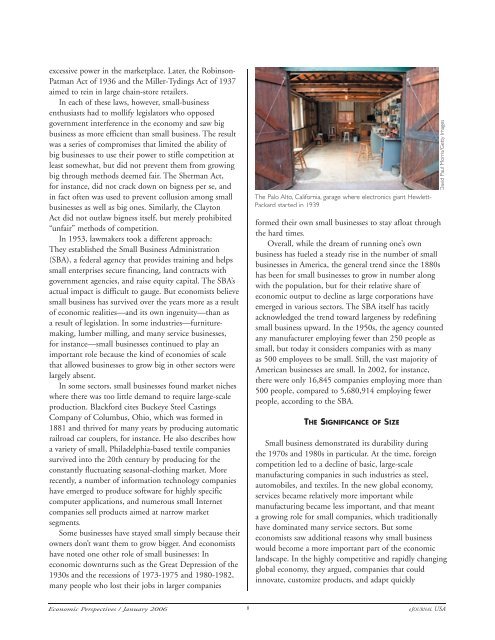Entrepreneurship and Small Business - Embassy of the United States
Entrepreneurship and Small Business - Embassy of the United States
Entrepreneurship and Small Business - Embassy of the United States
Create successful ePaper yourself
Turn your PDF publications into a flip-book with our unique Google optimized e-Paper software.
excessive power in <strong>the</strong> marketplace. Later, <strong>the</strong> Robinson-<br />
Patman Act <strong>of</strong> 1936 <strong>and</strong> <strong>the</strong> Miller-Tydings Act <strong>of</strong> 1937<br />
aimed to rein in large chain-store retailers.<br />
In each <strong>of</strong> <strong>the</strong>se laws, however, small-business<br />
enthusiasts had to mollify legislators who opposed<br />
government interference in <strong>the</strong> economy <strong>and</strong> saw big<br />
business as more efficient than small business. The result<br />
was a series <strong>of</strong> compromises that limited <strong>the</strong> ability <strong>of</strong><br />
big businesses to use <strong>the</strong>ir power to stifle competition at<br />
least somewhat, but did not prevent <strong>the</strong>m from growing<br />
big through methods deemed fair. The Sherman Act,<br />
for instance, did not crack down on bigness per se, <strong>and</strong><br />
in fact <strong>of</strong>ten was used to prevent collusion among small<br />
businesses as well as big ones. Similarly, <strong>the</strong> Clayton<br />
Act did not outlaw bigness itself, but merely prohibited<br />
“unfair” methods <strong>of</strong> competition.<br />
In 1953, lawmakers took a different approach:<br />
They established <strong>the</strong> <strong>Small</strong> <strong>Business</strong> Administration<br />
(SBA), a federal agency that provides training <strong>and</strong> helps<br />
small enterprises secure financing, l<strong>and</strong> contracts with<br />
government agencies, <strong>and</strong> raise equity capital. The SBA’s<br />
actual impact is difficult to gauge. But economists believe<br />
small business has survived over <strong>the</strong> years more as a result<br />
<strong>of</strong> economic realities—<strong>and</strong> its own ingenuity—than as<br />
a result <strong>of</strong> legislation. In some industries—furnituremaking,<br />
lumber milling, <strong>and</strong> many service businesses,<br />
for instance—small businesses continued to play an<br />
important role because <strong>the</strong> kind <strong>of</strong> economies <strong>of</strong> scale<br />
that allowed businesses to grow big in o<strong>the</strong>r sectors were<br />
largely absent.<br />
In some sectors, small businesses found market niches<br />
where <strong>the</strong>re was too little dem<strong>and</strong> to require large-scale<br />
production. Blackford cites Buckeye Steel Castings<br />
Company <strong>of</strong> Columbus, Ohio, which was formed in<br />
1881 <strong>and</strong> thrived for many years by producing automatic<br />
railroad car couplers, for instance. He also describes how<br />
a variety <strong>of</strong> small, Philadelphia-based textile companies<br />
survived into <strong>the</strong> 20th century by producing for <strong>the</strong><br />
constantly fluctuating seasonal-clothing market. More<br />
recently, a number <strong>of</strong> information technology companies<br />
have emerged to produce s<strong>of</strong>tware for highly specific<br />
computer applications, <strong>and</strong> numerous small Internet<br />
companies sell products aimed at narrow market<br />
segments.<br />
Some businesses have stayed small simply because <strong>the</strong>ir<br />
owners don’t want <strong>the</strong>m to grow bigger. And economists<br />
have noted one o<strong>the</strong>r role <strong>of</strong> small businesses: In<br />
economic downturns such as <strong>the</strong> Great Depression <strong>of</strong> <strong>the</strong><br />
1930s <strong>and</strong> <strong>the</strong> recessions <strong>of</strong> 1973-1975 <strong>and</strong> 1980-1982,<br />
many people who lost <strong>the</strong>ir jobs in larger companies<br />
The Palo Alto, California, garage where electronics giant Hewlett-<br />
Packard started in 1939.<br />
formed <strong>the</strong>ir own small businesses to stay afloat through<br />
<strong>the</strong> hard times.<br />
Overall, while <strong>the</strong> dream <strong>of</strong> running one’s own<br />
business has fueled a steady rise in <strong>the</strong> number <strong>of</strong> small<br />
businesses in America, <strong>the</strong> general trend since <strong>the</strong> 1880s<br />
has been for small businesses to grow in number along<br />
with <strong>the</strong> population, but for <strong>the</strong>ir relative share <strong>of</strong><br />
economic output to decline as large corporations have<br />
emerged in various sectors. The SBA itself has tacitly<br />
acknowledged <strong>the</strong> trend toward largeness by redefining<br />
small business upward. In <strong>the</strong> 1950s, <strong>the</strong> agency counted<br />
any manufacturer employing fewer than 250 people as<br />
small, but today it considers companies with as many<br />
as 500 employees to be small. Still, <strong>the</strong> vast majority <strong>of</strong><br />
American businesses are small. In 2002, for instance,<br />
<strong>the</strong>re were only 16,845 companies employing more than<br />
500 people, compared to 5,680,914 employing fewer<br />
people, according to <strong>the</strong> SBA.<br />
THE SIGNIFICANCE OF SIZE<br />
<strong>Small</strong> business demonstrated its durability during<br />
<strong>the</strong> 1970s <strong>and</strong> 1980s in particular. At <strong>the</strong> time, foreign<br />
competition led to a decline <strong>of</strong> basic, large-scale<br />
manufacturing companies in such industries as steel,<br />
automobiles, <strong>and</strong> textiles. In <strong>the</strong> new global economy,<br />
services became relatively more important while<br />
manufacturing became less important, <strong>and</strong> that meant<br />
a growing role for small companies, which traditionally<br />
have dominated many service sectors. But some<br />
economists saw additional reasons why small business<br />
would become a more important part <strong>of</strong> <strong>the</strong> economic<br />
l<strong>and</strong>scape. In <strong>the</strong> highly competitive <strong>and</strong> rapidly changing<br />
global economy, <strong>the</strong>y argued, companies that could<br />
innovate, customize products, <strong>and</strong> adapt quickly<br />
David Paul Morris/Getty Images<br />
Economic Perspectives / January 2006 8<br />
eJOURNALe USA












